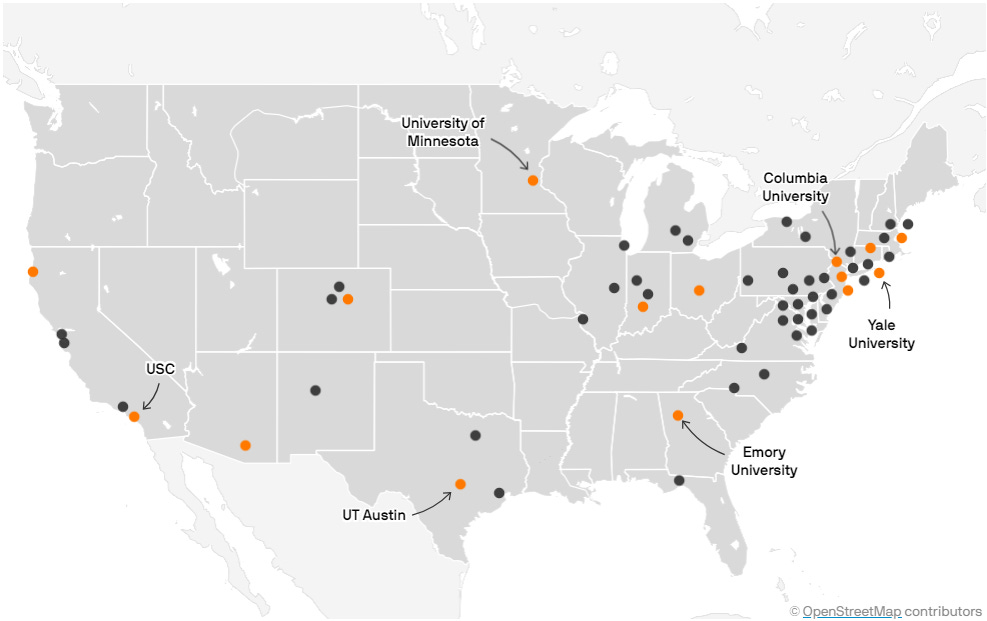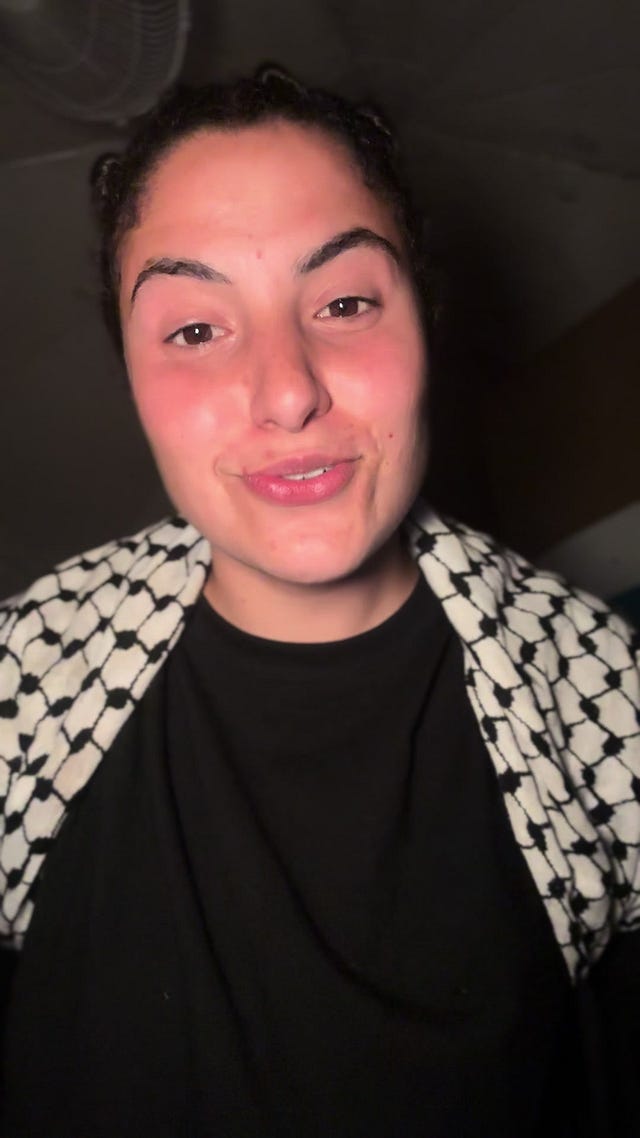Supporting Students During Mass Protest
Resources for students, faculty, and non-academia folks.
Hey all, this would normally be a “paid newsletter” week, but there’s so much happening on college campuses that I thought I would share some important resources.
On college campuses around the country, protests are taking place in support of Palestinian liberation and divestment of those colleges from the military-industrial complex. These protests have led to some major wins, such as UC Davis and other schools divesting from Israeli businesses. However, police and military have been called on students everywhere from USC, UT Austin, Princeton, an Emory. The student encampments at Columbia University have drawn the most media attention due to the police brutality involved, comparisons to past protests, and the extreme irony that the school’s Arab president (Minouche Shafik) was the one who called the cops on students protesting for Palestine.

In addition, USC initially canceled its Muslim valedictorian’s graduation speech out of fear that she would discuss Palestine, and in response to the outcry about this, have since canceled their entire graduation ceremony. Let’s say that another way: USC would rather not have their graduation ceremony than let a Muslim student speak at it. The racism is beyond words.
As my feed is awash in videos of extreme police brutality, including allegedly snipers on the roof on Ohio and Indiana, it’s hard not to think about how students feel in moments like these. I stand in full solidarity with the encampments, sit-ins, and other protests happening around the country. I also fully condemn any anti-Semitism taking place in the periphery of these protests (although this is usually only brought up as a tactic to delegitimize the student action; in reality, Jewish students are the ones protesting and being brutalized by cops).
While the main theme of the protests is Palestinian liberation and divestment from war profiteering, it’s fascinating to see how this intersects with broader issues of free speech, corporate donors at universities, and police violence in general. Faculty, in particular, have been moved to join students due to the inherent issue of academic freedom (perhaps even more so than being pro-Palestine). I think it’s so important for faculty to stand in solidarity with students, as we’ve seen at Columbia and even my own institution, UMass Amherst! (Who, by the way, are being investigated for anti-Arab bias at the institutional level as we speak. “Be Revolutionary”!)
Let’s remember that these students aren’t just working toward tangible, measurable goals; they are giving hope to the people of Palestine. In an invigorating video, the now-famous reporter Bisan states that the U.S. campus protests have given her the hope that one day she’ll return to her home in Gaza to rebuild, celebrate, and rest.
 Tiktok failed to load.
Tiktok failed to load.Enable 3rd party cookies or use another browser
If you care about freedom of speech, you’ll find some ways to show solidarity with these students below. If I hear of anything else that’s useful, I will update this post.
How Anybody Can Help
Other than posting on socials and talking to your friends and coworkers, anybody can help support students who are being brutalized around the country.
Donate to a bail fund here: https://campusbailfunds.com/
Find a protest to join here: https://www.protectpalestine.org/
Write to your local university’s president to ask them to stop arresting students who are creating encampments. An automatic email to the most popular few can be found here: https://act.newmode.net/action/mpower-change/stop-suppression-students-against-genocide
Follow the students involved in theses protests in addition to (or instead of) getting your news from mainstream media. For example, Maryam is a Columbia student giving updates on Twitter, and Dr. Devon Price is giving updates from Northwestern University’s liberated zone. Brenna Lip has a great video about what’s really going on at Columbia.
How Faculty Can Help
First off, know your rights. Check in with your union about what you’re allowed to do and say in support of students. “Academic freedom” goes a long way!
In addition to the general protest tips below, faculty can help these students by joining in these protests and helping to protect them. You can also hold your class at or near the encampment. If you can’t make it to the in-person protest for whatever reason, you can be kind to your students who are protesting by granting them homework extensions or makeup exams, allowing them to be excused from class, or canceling class altogether on a protest day. Since we’re entering the final weeks of the semester, I’ve even seen some faculty canceling their final projects and exams; consider it!
If a student in your class gets arrested, you can be an advocate for them when they’re going through your institution’s disciplinary procedures. Go with them to their meeting with college administrators and ask potentially-disarming questions: Which specific part of the student code of conduct did they break? Can you show me the rule on paper? Why are they being given *this* level of disciplinary action and not some lower level?
You can also do a teach-in for your class by connecting your learning material to the protests, colonialism, or some other aspect of liberation. For example, in my green chemistry class last semester, I paused class to talk to students about what was going on in Palestine, why other students were protesting, and the greenwashing of Israel’s attacks on Gaza (at the time, and still now, there were talks about turning a leveled Gaza into a “sustainable city”!) If I, a chemical engineer, can talk about it, so can you!
If your school has a Faculty for Justice in Palestine chapter, they can help you do a teach-in and give you action items specific to your school. Join an FJP chapter and find tons of teaching resources here: https://www.fjp-network.org/
Talk to your colleagues; they might feel the same way as you, but are afraid to speak up or aren’t as well-connected as you are. Make sure they know their rights and all the pointers above. STEM departments are usually the ones with the closest ties to the military-industrial complex, which is exactly what many of these protests are about, meaning if you’re in STEM, you have more sway on this issue.
Tips For Protesting Students
First of all, y’all are doing amazing. Keep it up! Just remember to be safe and look to your campus leaders about media relations.
Please look up guides about protest safety and also digital safety (leaving your phone at home, opting out of facial recognition, etc.) Also, know your rights as either a U.S. citizen or a non-U.S. citizen. Make sure you know your rights in your state/county/city/whatever.
Also, make sure that the only people talking to the media are the people designated by your group as media-trained. Remember, you are not the main character. You might make your entire movement look foolish if you don’t answer questions appropriately. Also, don’t entertain people who are specifically trying to agitate you (e.g., Zionists). Ignore them, keep doing your thing, do not engage.
Lastly, please try to root out and find the potential bad actors in your group. Anti-Semitism, racism, anti-queer bias, etc. are unacceptable and people who engage with your protest in these ways should be kicked out. Of course, not everyone is a secret Nazi; as my favorite TikTok reverend put it, many people are just on a learning curve when it comes to anti-Semitism; calling in instead of calling out can go a long way.
…Oh, and don’t forget to have a little fun :)
Further Reading
A TTSG podcast episode on the protests and their larger cultural meaning.
A deep dive into Ethiopian student protests by a Black trans creator.
An open letter to the President of UT Austin by an Indigenous alumni.
Again, the FJP page has tons of political education for you.
The Palestinian Feminist Collective’s All Out for Palestine Toolkit, which is always available in my website’s link tree.
Always remember who we do this for…
And now, your weekly Koko.

Solidarity forever,
-Anna







